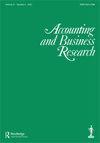保险:在“太难”的盒子里还是外面?
IF 1.4
4区 管理学
Q2 BUSINESS, FINANCE
引用次数: 3
摘要
《国际财务报告准则第17号》要求对保险公司的会计进行重大变更,我们将探讨其实施过程中产生的一些摩擦。我们提出三点。首先,由于IFRS 17是一个基于原则的标准,它的实施成本很高。审计委员会必须成为生成报告的底层模型的资深用户。其次,我们考察了萨班斯-奥克斯利法案对美国公共保险公司的影响,以及对私营保险公司的类似法律,以评估遵守新规则的成本。我们发现有证据表明,这些成本在整个行业的发生率各不相同。第三,我们对有关IFRS 17的颁布和实施的具体公告进行事件研究。我们发现有关实施的公告存在负面情绪。然而,我们无法确定负面情绪的单一具体理由,因为它可能与几个因素有关。总之,我们发现将保险会计作为国际财务报告准则的一部分有很多原因,也有一些原因可能导致实施延迟,但任何对该会计准则“太难”的担忧可能不是由于标准本身,而是由于其他可能反映该标准对投资者的最终净收益的事情。本文章由计算机程序翻译,如有差异,请以英文原文为准。
Insurance: in or out of the ‘too difficult’ box?
IFRS 17 requires a significant change to insurer accounting, and we look at some of the frictions resulting from its implementation. We make three points. First, since IFRS 17 is a principles-based standard, it will be costly to implement. Audit committees must become sophisticated users of the underlying models generating the reports. Second, we examine the effect of the Sarbanes-Oxley Act on U.S. public insurers and a similar law for private insurers to assess the costs of complying with new rules. We find evidence that these costs vary in their incidence across the industry. Third, we conduct an event study of specific announcements regarding IFRS 17 promulgation and implementation. We find a negative sentiment for announcements concerning the implementation. However, we cannot identify a single specific rationale for the negative sentiment as it could be related to several factors. In sum, we find that there are many reasons to keep insurance accounting as part of IFRS and some reasons that may lead to delays in implementation, but any concern this accounting standard is ‘too difficult’ is likely not due to the standard itself but to other things that may reflect the ultimate net benefits of the standard to investors.
求助全文
通过发布文献求助,成功后即可免费获取论文全文。
去求助
来源期刊

Accounting and Business Research
BUSINESS, FINANCE-
CiteScore
3.40
自引率
11.80%
发文量
38
期刊介绍:
Accounting and Business Research publishes papers containing a substantial and original contribution to knowledge. Papers may cover any area of accounting, broadly defined and including corporate governance, auditing and taxation. However the focus must be accounting, rather than (corporate) finance or general management. Authors may take a theoretical or an empirical approach, using either quantitative or qualitative methods. They may aim to contribute to developing and understanding the role of accounting in business. Papers should be rigorous but also written in a way that makes them intelligible to a wide range of academics and, where appropriate, practitioners.
 求助内容:
求助内容: 应助结果提醒方式:
应助结果提醒方式:


